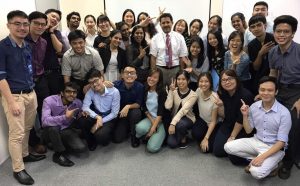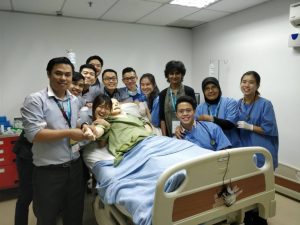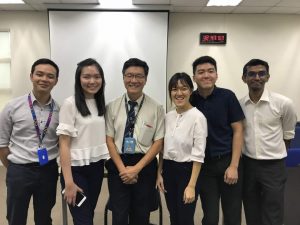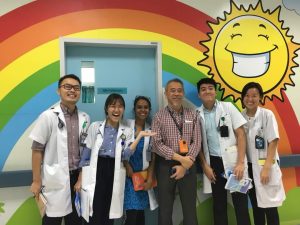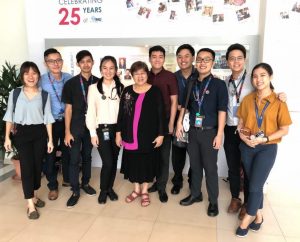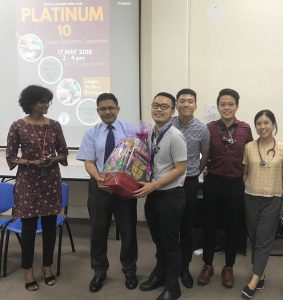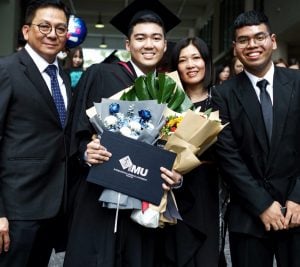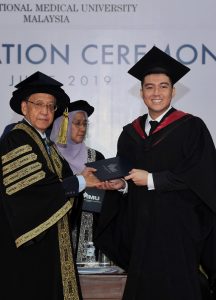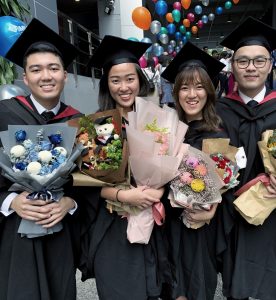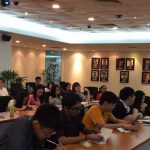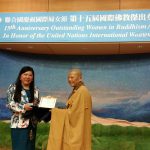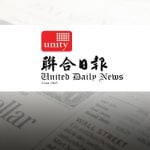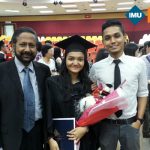I often find much difficulty in providing a satisfactory answer when asked why I did medicine in the first place. Partly it is because that I did not have the noblest reason, and partly it is because that I never mused on that question seriously. 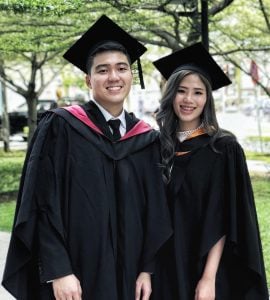 Back when I was a teenage boy, I struggled with what most adolescent had struggled, acne vulgaris. As a timid young boy who was shy to leave his comfort zone to see a doctor, I began to take interest in dermatology in an effort to get my acne cured without having to leave the comfort of my house. Thus, my acne experience started my unrelenting effort to improve my skin and in a way, invoked my interest in reading medicine. I must admit that my reason for doing medicine is one of the silliest out there and neither is it princely nor the noblest, but I believe, a trigger no matter how silly or trivial it is, can spark a fire that leads to greatness. Selecting a career pathway when we just left high school is no doubt daunting and I too struggled with choosing what was best for me during then. In my quandary, I re-evaluated my interests and eventually settled for the one that intrigued me the most – medicine. In choosing a career, my advice is to not be ashamed to pursue anything that sparks your interest, because at the end of the day, you would never know what you can achieve with that small little interest of yours. Interest and passion are the keys to drive your will to succeed, and are always there to remind you on the very reason that you embarked on this journey. However, it would also be wise to get insight from relevant or experienced parties on the lifestyle that the career of interest might provide in the future before committing yourself. Do remember to evaluate your career options sagaciously before embarking on a journey which might be long and tremulous.
Back when I was a teenage boy, I struggled with what most adolescent had struggled, acne vulgaris. As a timid young boy who was shy to leave his comfort zone to see a doctor, I began to take interest in dermatology in an effort to get my acne cured without having to leave the comfort of my house. Thus, my acne experience started my unrelenting effort to improve my skin and in a way, invoked my interest in reading medicine. I must admit that my reason for doing medicine is one of the silliest out there and neither is it princely nor the noblest, but I believe, a trigger no matter how silly or trivial it is, can spark a fire that leads to greatness. Selecting a career pathway when we just left high school is no doubt daunting and I too struggled with choosing what was best for me during then. In my quandary, I re-evaluated my interests and eventually settled for the one that intrigued me the most – medicine. In choosing a career, my advice is to not be ashamed to pursue anything that sparks your interest, because at the end of the day, you would never know what you can achieve with that small little interest of yours. Interest and passion are the keys to drive your will to succeed, and are always there to remind you on the very reason that you embarked on this journey. However, it would also be wise to get insight from relevant or experienced parties on the lifestyle that the career of interest might provide in the future before committing yourself. Do remember to evaluate your career options sagaciously before embarking on a journey which might be long and tremulous.
| What were the challenges that you faced prior to pursuing medicine? |
|---|
| For me, my journey in medicine started with a major setback when I failed to attain 9A+ in SPM, which disqualified me to receive scholarship from the government’s Public Service Department for my tertiary education. Thankfully, my family was extremely supportive and my father even promised that he would support me no matter what even if he had to sell off our house. Till today, I am forever grateful to my family as without their continuous support, I would have never made it this far. I would attribute my driving factor to succeed to my parent’s sacrifice and also the disappointing experience when I failed to attain the scholarship. I wanted to prove to the others that I am actually not too bad too. I learned that in the face of failure, despair will do you no good. In turn, make every failure a lesson, and make these experiences fuel your motivation. You should never fail for nothing in exchange. |
| Why did you choose IMU for your medical training? |
| When it came to choosing a medical school, IMU being the most reputable private healthcare university in Malaysia was naturally my first choice, and through my five-year long experience in IMU, I have definitely learned not only medicine, but also the various values of humanity from this institution. |
| During your studies, did you face any difficulties? If so, how did you manage? |
|---|
| Pursing medicine is never akin to sailing on a windless sea. There were many difficult times throughout my journey while pursuing medicine at IMU. For me, every examination period was difficult. In IMU, we were expected to be nothing but the best and it was certainly easy to get stressed up and to panic during these hardships. However, I like to think that these hardships that I face today will shape me to be a better person tomorrow, and that these hardships are just stepping stones to realise my final goal. I always remind myself during these tremulous moments to always remember that when the time comes, I must be able to provide care and comfort for my patients. I always believed that as a doctor, our role is to cure sometimes, but to comfort always. Besides that, I believe having a group of supportive friends is extremely important too. They are there for us for most of the days and resonates our woes and cries. I am grateful that during my time at IMU, I was supported by nine of such exemplary friends (now doctors). They were there when I required assistance, and were there where I needed the morale boost. Without them, life in medical school would certainly be unbearable. |
| What was the most memorable experience of yours in IMU? |
| In a clinical simulation during my clinical years, my colleagues and I were given an emergency case and we were tasked to attend to a mannequin. The ‘patient’ was fine initially but got worse progressively. The ‘patient’ went into cardiac arrest subsequently and we knew that he required advanced cardiac life support. Unbeknownst to us, we have incorrectly placed the ECG cables and thus, the ECG rhythm was not displayed on the monitor. However, when the patient coded, we panicked and mistook the pulse oximeter pleth (displayed just below the ECG rhythm in the patient’s monitor) as the cardiac rhythm that showed ventricular fibrillation, which defibrillation was required. We went along nevertheless, but the mannequin did not survive at the end. True enough, this was only but a simulation. However, I was beyond disappointed in myself for committing such a silly mistake as this could very well happen in the real life. This incidence not only emphasised the need to remain calm in the face of an unexpected event, but also to be meticulous even in the simplest task. |
| What was your most memorable patient encounter? |
| During my surgical rotation, I met a patient who was admitted for critical limb ischaemia. Her leg was already gangrenous, and she was in immense pain. As she had already lost her other leg from amputation due to diabetes many years ago, she was not keen to have her only leg amputated. She then transferred to a private institution seeking alternative treatment, but returned nonetheless after a few days as it was made clear to her that the amputation was necessary. During her stay, we had lengthy conversations about her life, her difficulties with amputation, her family and her hopes for the future. She shared many of her stories and experiences which I enjoyed listening to. Following our conversations, I was surprised when she told me that she was ready to cope with the loss of both her lower limbs. We even discussed on how she was going to live her life without her legs. Prior to her operation, she thanked me profusely for keeping her company, motivating her, and making her less afraid of what her future might be. When she cried thanking me, I knew I have touched her heart. The next day when I went to the ward, I was shocked to discover that she had passed away after her surgery. She became unconscious during the night and resuscitation efforts were in vain. Many questions ran through my mind and her sudden demise left a void in me as it was just yesterday that we met and made plans together. Although I know I can never bring her back, I find solace knowing that she was not despaired, and not afraid. Through this, I learned that as a doctor, we are powerless at times, and that what we can do, is to make our patients a little less scared, and a little less lonely. |
| Besides your studies in medicine, were you involved in any extra-curricular activities? |
|---|
| During my days in the clinical years, I was also involved in the Student’s Representative Council (SRC) as a vice secretary and later, the secretary. These activities outside of the curriculum not only helped shaped my character to be more responsible, but also introduced me to essential administrative skills and soft-skills which cannot be gathered inside the closed door of classroom and wards. Achieving balance between academics and extra-curricular activities required nothing less than self-discipline and wise time management. Exploring activities beyond your usual one will not only help widen your horizon, but in turn might surprise you with some unexpected rewards like networks, skills and opportunities. All it takes is to take the first leap and make less excuses for yourself. |
| How did you feel when you were announced to be the recipient for the prestigious Dr John Joseph Bosco Memorial Gold Medal? |
| When I was announced to be the recipient for the Dr John Joseph Bosco Memorial Gold Medal, I was deeply humbled as I firmly believe each of my colleagues is exceptional in their own right. Looking back, it was indeed a difficulty journey, and an even more difficult feat to accomplish. However, I have no one to credit but only my friends and lecturers. Attaining such accomplishment is never due to my effort alone, but also theirs. |
| What is your advice to those who are still studying medicine? |
| As I delved deeper along the path of medicine, I realised that medicine is unforgiving, and demands nothing less than competent skills, astute reasoning, and most importantly, a kind heart that expresses empathy and understanding. Being only good with books is never enough in medicine, and we must proactively subject ourselves to ample clinical exposure and work. One of my professors in IMU always tell me, ‘you read, but you do not read’. Although I did not understand that phrase at first, I later realised that what he said is especially true as without the relevant experience, we can never appreciate the true meaning of the words written in our textbooks. In medicine, one must always be analytical, observant, meticulous and humble. As the popular saying goes, the eyes do not see what the mind does not know. The wisdom and experience we gain through clinical works are essential to building a better clinical reasoning and judgement. I was told that medicine is first an art, and then science, which I wholeheartedly agree. My advice to those who are pursuing medicine is that, be inquisitive always and learn to focus on the big picture rather that micro-studying. Do not be ashamed to learn from everyone and anyone because each of them knows something that you don’t. Learn to interpret how your colleagues and lecturer think and reason, and learn to reflect on every patient encounter for they are your best teachers. But most importantly, to be humble and never to overween. |
Looking back the for past 5 years, I have become so much more than what I was before. I have matured, made many friends, learned many things, inspired by dedicated lecturers, frustrated by numerous conflicts, touched by my patient’s plight, and most importantly, connected with the humane side of mine. But of course, this is only but the beginning of my journey. However, as I sail this uncharted route of mine, I am confident that IMU has prepared all of us for what is to come. On the side note, in case you are still wondering, no, I am no longer interested in dermatology.
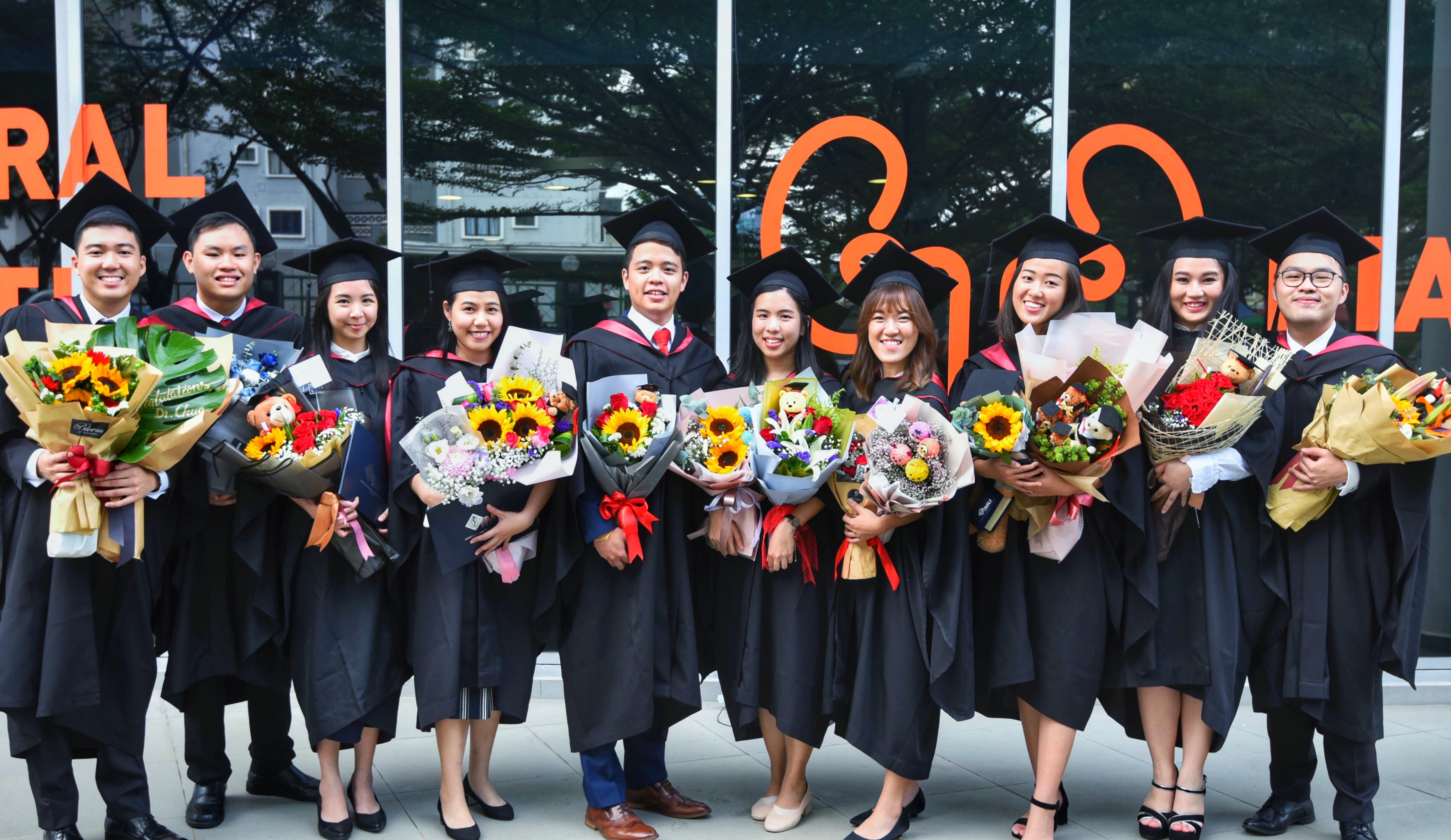
Written by Chua Min Huang
Related article: The International Medical University Confers One of its Founders with the Honorary Doctor of Medical Education





